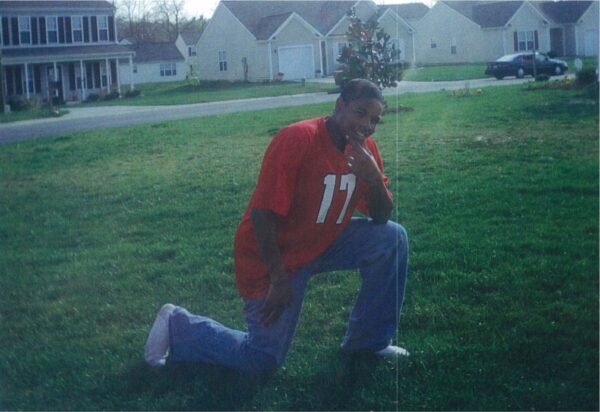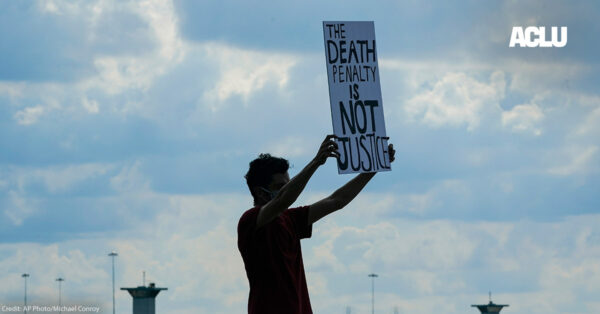Historic Hearing Challenging Racial Bias in North Carolina’s Death Penalty Concludes with Overwhelming Evidence of Discrimination in Capital Cases
North Carolina v. Hasson Bacote, the leading case filed under NC’s Racial Justice Act, could affect more than 100 people on death row
SMITHFIELD, N.C. — A historic Racial Justice Act hearing came to a close Friday after two weeks of testimony that illustrated the discrimination inherent in North Carolina’s death penalty. The evidence showed a clear and persistent pattern of racial bias in jury exclusions that denies people of color the opportunity to serve on capital juries and leads to a disproportionate number of extreme sentences for Black men, as well as a direct line between modern death sentences and the state’s history of racial terrorism.
“We have white prosecutors standing in front of overwhelmingly white juries comparing Black defendants facing the death penalty to animals — ‘mad dogs,’ ‘hyenas,’ ‘predators of the African plain,’” said Henderson Hill, senior counsel with the American Civil Liberties Union’s Capital Punishment Project. “The racism in North Carolina’s application of the death penalty is so clear it’s blinding.”
The hearing began Feb. 26, and centered on the case of Hasson Bacote, a Black man from Johnston County who was sentenced to death in 2009. Bacote argued that race played an impermissible role in jury selection — not just in his case, but in all death penalty cases in North Carolina. The lawsuit was filed in 2010 under North Carolina’s Racial Justice Act, and is likely to affect more than 100 people currently living on the state’s death row. Mr. Bacote is represented by the ACLU Capital Punishment Project, the Legal Defense Fund, the Center for Death Penalty Litigation, and attorney Jay Ferguson.
Bacote is one of eight Black men who have faced capital trials in Johnston County — all eight were sentenced to death. Nationally acclaimed public interest attorney Bryan Stevenson, who founded the Equal Justice Initiative and authored the book Just Mercy, took the stand to put Bacote’s case in context. Stevenson said the trial echoed trends he’s seen across the South, in which prosecutors strike Black jurors for reasons that are clearly a pretext for race. He cited several examples of pervasive discrimination in jury selection, including:
- Prosecutors struck Black jurors because of NAACP membership, connections to historically Black colleges, and living in majority-Black neighborhoods — and then claimed that those reasons were “race-neutral.”
- Prosecutors believed their strikes of Black jurors could not be racist because they had allowed other Black people to remain on the jury, as if the law ensured “a quota system and not a legitimate opportunity for every person.”
- Prosecutors in North Carolina, who are overwhelmingly white, questioned Black jurors with the presumption that they were dishonest or hostile to the state, asking them essentially to “prove to me that I can put you on the jury despite the fact that you’re Black.”
“Next to voting, serving on a jury is the most significant thing a citizen gets to do to participate in the democratic process,” Stevenson said. “It’s a big deal to contribute to democracy on a jury. And for a lot of people who have never had that opportunity, never had that chance, because of their race or their gender, it’s also a big deal when we continue to tolerate that exclusion.”
Tufts University social psychologist Sam Sommers took the stand to explain the concept of implicit bias, which drives people to discriminate even when they have no conscious intent. He said that strikes driven by “gut feelings” about jurors, as well as their body language and demeanor, can be heavily influenced by implicit bias.
Emory University historian Crystal Sanders testified to the full picture of racism in Johnston County, where her family has lived for generations and her ancestors were once enslaved. In addition to billboards promoting the Ku Klux Klan, which stood in several locations around Johnston County until the late 1970s, she cited many other examples of how Black people have been terrorized and disenfranchised in Johnston County, often at the hands of law enforcement and other leaders. Sanders detailed:
- Sustained Black voter suppression that has led to only a single Black person ever being elected to countywide office
- Housing segregation enforced by threats, violence and cross burnings documented into the 1980s and 1990s
- Public KKK rallies that happened as late as 2001
- Egregious wrongful convictions of Black teenagers, including 16-year-old Terence Garner in 1998, which caused a national outcry
- Police killings of restrained and subdued Black men that were never punished
- Openly racist statements made by the county sheriff in the local newspaper
University of North Carolina historian Seth Kotch testified about continuing lynching threats made against people facing the death penalty — threats that often came from people in the jury pool. He said modern capital trials reveal “the endurance of the idea that certain defendants deserve death rather than due process.”
This evidence was supported by several experts who provided statistical analyses showing that prosecutors across North Carolina used peremptory strikes to exclude qualified Black citizens from capital juries at more than twice the rate of white citizens. And in Johnston County, prosecutors struck qualified Black citizens from juries at three times the rate of whites.
In cases prosecuted by Greg Butler, who sent Bacote and several other men to death row, Black citizens were 10 times as likely to be struck. Butler used the racially coded term “thug” to describe Bacote to the jury.
During his testimony, Butler refused to acknowledge that racial bias, whether conscious or implicit, could have been a factor.
“I hope our state’s leaders will look at this incredible body of evidence and see it as a call to action,” said Gretchen Engel, executive director of the Center for Death Penalty Litigation. “So far, we’ve mostly seen our state’s prosecutors attempt to bury the evidence. Now, it’s time for us to come together, confront the facts head on, and figure out how we’re going to root out the deeply embedded racism in our courtrooms.”
More on North Carolina v. Hasson Bacote:




